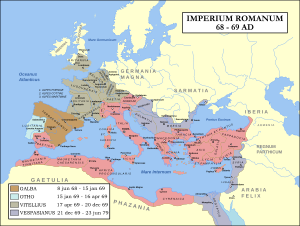Gaius Octavius Tidius Tossianus Lucius Javolenus Priscus facts for kids
Quick facts for kids
Gaius Octavius Tidius Tossianus Lucius Javolenus Priscus
|
|
|---|---|
| Consul of the Roman Republic | |
| In office September 86 – December 86 Serving with Aulus Bucius Lappius Maximus
|
|
| Preceded by | Sextus Octavius Fronto with Tiberius Julius Candidus Marius Celsus |
| Succeeded by | Domitian XIII with Lucius Volusius Saturninus |
| Personal details | |
| Born | Unknown |
| Died | Unknown |
| Military service | |
| Allegiance | |
| Commands | Proconsul of Africa Governor of Germania Superior Governor of Britain Governor of Syria Governor of Numidia Pontifex |
Gaius Octavius Tidius Tossianus Lucius Javolenus Priscus was an important Roman senator and a skilled jurist (a legal expert or judge). He lived during the time of the Flavian dynasty, a powerful family that ruled the Roman Empire. Many of his legal decisions and ideas are still found in the Digest, a huge collection of Roman laws.
Priscus held a very high position in the Roman government. He served as a suffect consul from September to December in 86 AD. A suffect consul was like a temporary top official, sharing the role with Aulus Bucius Lappius Maximus.
Contents
Understanding His Name

You might see him called "Lucius Javolenus Priscus," which is a shorter version of his full name. His complete name, Gaius Octavius Tidius Tossianus Lucius Javolenus Priscus, is very long! Roman names could be complicated, especially if someone was adopted.
Experts believe his names like Javolenus, Tidius, and Tossianus suggest his family might have come from a region in Italy called Umbria. However, other clues connect him to a place called Nedium in Dalmatia. It's possible he was born a C. Octavius and later joined an Umbrian family through adoption. This shows how Roman naming customs could be quite complex.
His Important Roman Career
We don't know much about Javolenus Priscus's early life. His first known role was leading a Roman army group called Legio IV Flavia Felix in what is now Croatia. He might have joined the Senate (the Roman government body) at a high level without having to go through all the usual steps.
Leading Roman Legions
In 83 AD, Priscus became the commander of another army group, Legio III Augusta. This job also made him the de facto (unofficial but actual) governor of Numidia, a Roman province in North Africa.
Serving as a Judge in Britain
Around 84 AD, Javolenus Priscus went to Roman Britain. There, he worked as a juridicus, which means he was a senior judge. He stayed in Britain for two years, handling important legal cases.
Reaching the Top: Consulship
After his time in Britain, he returned to Rome. Becoming a consul was one of the highest honors a Roman citizen could achieve. As mentioned, he served as a consul in 86 AD.
Governing Roman Provinces
Priscus continued to serve the Empire in many ways. A special document from 90 AD shows he was the governor of Germania Superior, a Roman province in what is now Germany. Later, at the start of Emperor Trajan's rule, he was the governor of Syria, a large province in the Middle East.
From 101 to 102 AD, he was the proconsul of Africa, which covered the area of modern Tunisia. A proconsul was a powerful governor in charge of a province.
Joining the Priests
After all his travels and important jobs, Priscus returned to Rome one last time. He was chosen to join the College of Pontiffs. This was the most important group of priests in ancient Rome. Their job was to oversee state religious ceremonies and give advice on religious laws.
His Work as a Legal Expert
Javolenus Priscus is most famous for his work as a jurist (legal expert). He was known for his smart legal opinions. For example, he once gave advice on the will (a legal document about what happens to someone's property after they die) of a naval officer from Britain. This case likely came to him when he was a judge there.
Priscus was also the leader of the Sabinian school, a group of legal thinkers. He even taught another very famous jurist named Salvius Julianus.
He is well-known for a wise saying about law: "Every definition in civil law is dangerous, for rare are those that cannot be subverted." This means that it's hard to make a perfect rule in law because there's almost always a way to find an exception or a loophole.
Images for kids
 | Jewel Prestage |
 | Ella Baker |
 | Fannie Lou Hamer |


